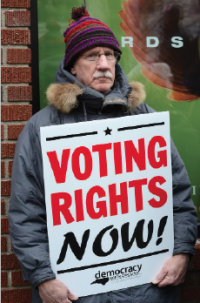Discriminating Against Minorities with Voting Right Laws
Discriminating Against Minorities with Voting Right Laws
 There is an alarming trend of state governments instituting restrictive voter identification laws, which disproportionately affect racial minorities. Although election administration is in the jurisdiction of state governments, federal protections exist for minority voters that have suffered from a history of exclusion.
There is an alarming trend of state governments instituting restrictive voter identification laws, which disproportionately affect racial minorities. Although election administration is in the jurisdiction of state governments, federal protections exist for minority voters that have suffered from a history of exclusion.
The Voting Rights Act of 1965, the most significant civil rights legislation in U.S. history, explicitly prohibits racial discrimination in voting. While contemporary laws may not explicitly cite race, the effective discrimination of minority voters is undeniable. A recent GAO report examined numerous studies concluding that restrictive voter identification laws suppressed minorities, with African-Americans ten percent less likely than white Americans to possess government-issued identification. Even defenders recognize the disproportionate impact of the laws, which suppress a specific voting bloc and tilt elections in favor of one political party. These efforts decrease turnout by the thousands despite actual cases of voter error being only a fraction of a percent. These outcomes demonstrate that such laws clearly violate the Voting Rights Act.
These facts have conveniently been ignored by the strict constructionists on the Supreme Court, who recently decided that Texas could purge its rolls of more than 600 000 voters less than a month prior to an election. In her dissent, Justice Ruth Bader Ginsburg stated that “racial discrimination in elections in Texas is no mere historical artifact. To the contrary, Texas has been found in violation of the Voting Rights Act in every redistricting cycle from and after 1970."
This followed a June 2013 SCOTUS decision to gut parts of the Act, empowering conservative groups to quickly enact blatantly discriminatory laws at the state and local levels without appropriate review from the Department of Justice. It also followed efforts by Texas officials in 2012 to threaten the Organization for Security and Cooperation (OSCE) with criminal prosecution because they intended to send election observers to Texas. These observations had been regularly performed since 2002, as has been the case with all OSCE participants, but the Texas officials could not be bothered with details after mistakenly identifying OSCE as a UN affiliate.
The Bill of Rights did not include voting rights, but the majority of amendments afterward relate to voting, including extending suffrage to women and racial minorities. Existing felony disenfranchisement laws in Iowa, Kentucky, and Florida continue to permanently strip rehabilitated citizens of voting rights. Remnants of Jim Crow policies persist as minorities are required to purchase voter identification as a precondition for voting despite such preconditions being abolished since the 1960s.
One may find solace in the Texas Secretary of State’s announcement that a record 14 million people have registered to vote in the recently past election. But the question remains: Why does a country that endorses free and fair elections abroad, not live up to the standard?
### Photo - February 2014 Moral March on Raleigh 56 by Flickr user Stephen D. Melkisethian.



